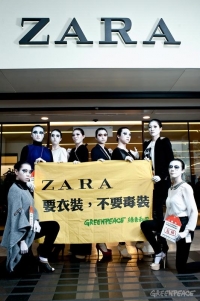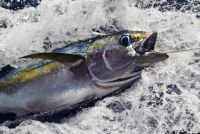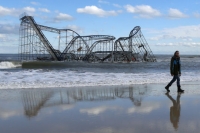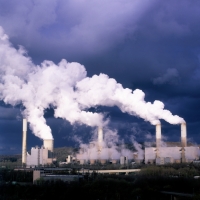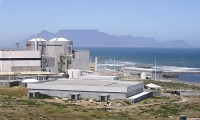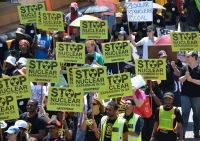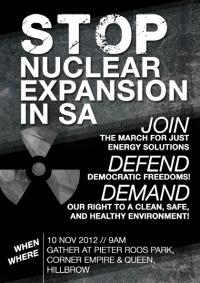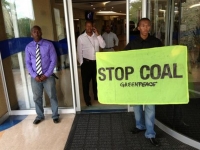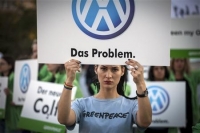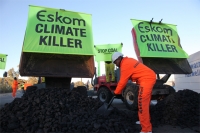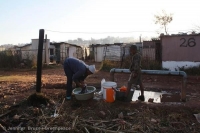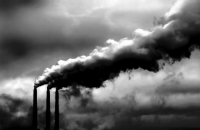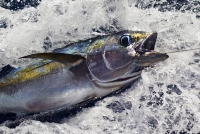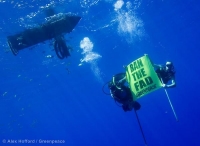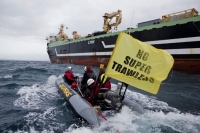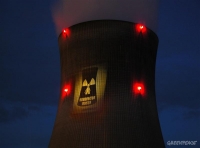Over the weekend South Africans joined the global call for Levi's to Detox. Over 700 activists in over 80 cities around the world made their voices heard and demanded that Levi's eliminate all hazardous chemicals from its clothing and supply chains.
As ministers arrived at climate talks in the Qatari capital Doha, Greenpeace urged European countries not to take the side of Poland and Russia in a battle over whether to maintain the Kyoto Protocol’s biggest loophole and to make real progress on a deal to prevent catastrophic climate change.
Zara, the world’s largest clothing retailer, today announced a commitment to go toxic-free following nine days of intense public pressure. This win belongs to the fashion-lovers, activists, bloggers and denizens of social media. This is people power in action.
The monitoring of tuna fisheries must be strengthened and transfers of fish at sea banned to end the overfishing crisis in the Indian Ocean, Greenpeace International said earlier this month after it again found illegal fishing operations in the region.
As governments meet for climate talks in Doha, Greenpeace warned on Monday that they must wake up to the reality that climate change is already gripping the planet and take urgent action to avoid catastrophic global warming.
Power supplier Eskom is breaking more environmental laws than any other state corporation, according to the latest National Environmental Compliance and Enforcement Report.
Outdoor clothing brands are selling women’s and children’s clothes with perfluorinated and polyfluorinated chemicals (PFCs) and other hazardous chemicals, according to findings from two independent laboratories commissioned by Greenpeace Germany.
Greenpeace Africa and the South African History Archives have lodged a formal complaint with both the Public Protector and SA Human Rights Commission with regards to the second refusal by the Minister of Energy to publicly release the Integrated Nuclear Infrastructure Review (INIR).
Earlier this week, environmental activists marched in cities around the country against the government’s nuclear expansion plans which they believe “threatens present and future generations.”
Several unions and community organsiations will take part in a major march in Joburg this Saturday to voice their opposition to South Africa’s nuclear expansion.
Last month, Greenpeace Africa, groundWork and Earthlife Africa took action against Eskom's reckless coal expansion at the utility's headquarters in Johannesburg. 14 activists were placed in police custody after the peaceful protest and taken to Sandton police station.
A German study has been published, offering a breakdown of the greenest premium carmakers in Germany. Meanwhile, Greenpeace's issues with Volkswagen continue.
Greenpeace activists have chained themselves to the entrance of Megawatt Park, Eskom’s headquarters in Johannesburg.
Greenpeace Africa has launched a report that paints an ugly picture of how Eskom’s coal addiction and this country’s water shortages are linked.
Nearly a million South African households still have no access to the minimum 25 litres of water per day. Eskom’s water-hungry coal expansion is a major threat to the country’s already stressed water resources, and further compromises water access for the poor, according to a report released by Greenpeace today.
Greenpeace held talks with the Mauritian government and key stakeholders about sustainable tuna fisheries this past weekend following the arrival of the Rainbow Warrior in Port Louis.
Less than 1% of the world’s oceans are protected from all human activity. We are fishing ourselves into a crisis that threatens global fish stocks, marine biodiversity and local economies.
In a huge victory against the plunder of our oceans, the Australian Federal Environment Minister Tony Burke has announced new laws that will ban the Margiris super trawler, now known as the Abel Tasman, from operating in Australian waters for up to two years.
Greenpeace Africa together with the South African History Archives (SAHA) have today submitted four requests for information on the management of nuclear energy in South Africa. These requests have been submitted due to the increasing lack of transparency and growing secrecy in this high-risk sector.
Foreign fishing vessels are stealing fish from the Indian Ocean, and depriving local communities of their livelihood.










